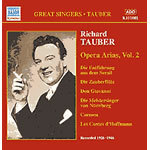
Richard Tauber, tenor
 $25.00
Out of Stock
$25.00
Out of Stock6+ weeks add to cart
Richard Tauber, tenor
Opera Arias (1926-1946)
[ Naxos Great Singers / CD ]
Release Date: Thursday 16 June 2005
This item is currently out of stock. It may take 6 or more weeks to obtain from when you place your order as this is a specialist product.
"The great Austrian lyric tenor was as remarkable for the range of his repertoire as for his sweet-voiced, stylish singing. Though this collection of 21 tracks, mostly dating from the late 1920s and 1930s, does not include the operetta roles that brought him his widest fame, it shows him excelling in everything from Mozart's Tamino to Wagner's Walther and Offenbach's Hoffmann (particularly memorable)."
- David Cairns, The Sunday Times, March 6, 2005
On the many styles he essayed Tauber superimposed an individual charm and an uncommon musicality. An above-average pianist and an accomplished conductor he was rated by Percy Kahn (sometime accompanist to Caruso, Mischa Elman and others) the most musicianly of singers. While he was universally lauded as a 'serious' lieder recitalist, operetta and lighter fare were, however, to provide his most congenial niche and lasting association. An avowed populist (in his heyday always ready to record a clutch of the latest pop and film tunes), by the mid-1930s Tauber was a screen celebrity and noted forerunner of what we nowadays term crossover -this despite the fact that his illustrious career began and ended in opera, and specifically in Mozart.
Richard Denemy Tauber was born the illegitimate son of theatrical parents in Linz, in Austria, on 16th May 1891. Although a born singer he at first showed little inclination to sing professionally, preferring to nurture his joint talents for piano and composition at the Conservatory of Frankfurt-am-Main, spurred by a burning ambition to become a conductor. Encouraged, however, by a period of vocal study with Heldentenor Karl Beines in Freiburg, in 1912 he was offered a contract by the Wiesbaden Theatre, of which his father had been appointed director, but rejected this for a further year's study with Beines. In March 1913 he made a more prestigious début at the Neues Stadt- Theater in Chemnitz, as Tamino in Die Zauberflöte and a few days later he sang Max in Der Freischütz and virtually overnight secured a five-year contract with the Dresden Royal Opera.
Tauber's first Dresden contract ran from August 1913 to the end of July 1918, an association which would last, notwithstanding contractual interruptions and appearances in opera and operetta appearances at the Berlin (from 1919) and Vienna State Operas and elsewhere, until 1926. Soon renowned as that rare thing among tenors, a musician, he was ever in demand as a stand-in for indisposed colleagues and his (essentially lyric tenor) repertoire, over sixty operas by more than forty composers, was remarkable in its diversity. In 1915 he sang Bacchus in Strauss's Ariadne at 48 hours' notice, after one piano runthrough with the composer, and by the time he made his earliest records (June 1919), critical acclaim throughout Europe and a reputation as a fast learner had preceded him.
Tracks:
Carmen: La fleur que tu m'avais jetee
Der Evangelimann, Op. 45: Selig sind die Verfolgung leiden
Der Freischutz: Nein, langer trag' ich nicht - Durch die Walder
Die Entfuhrung aus dem Serail, K. 384: Konstanze, Konstanze... O wie angstlich
Die Meistersinger von Nurnberg: Am stillen Herd
Die Meistersinger von Nurnberg: Morgenlich leuchtend (Preislied)
Die Zauberflote, K. 620: Dies Bildnis ist bezaubernd schon
Die Zauberflote, K. 620: Dies Bildnis ist bezuabernd schon
Don Giovanni, K. 527: Dalla sua pace
Don Giovanni, K. 527: Il mio tesoro Jocelyn, Op. 109: Berceuse (Caches dans cet asile)
Joseph: Vaterland ich musst' dich fruh lassen (Champs paternels)
Les contes d'Hoffmann: Es war einmal am Hofe (Il etait une fois a la cour d'Eisenach)
Les contes d'Hoffmann: Ha, wie in meiner Seele (O Dieu, de quelle ivresse)
Martha: Ach so fromm
Sadko: Hindulied
Tiefland: Mein Leben wagt' ich drum (Wolfserzahlung)
Tiefland: Wie ich nun gestern Abend (Traumzahlung) Trompeter von Sakkingen: Behut dich Gott
Turandot: Keiner schlafe (Nessun dorma)
Turandot: O weine nicht, Liu (Non piangere, Liu)
